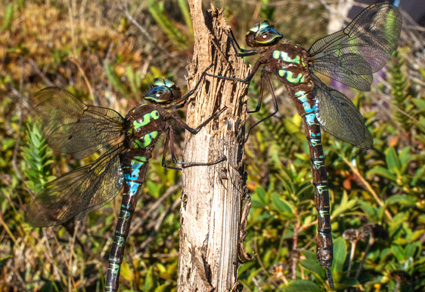Abstract
The species Rhionaeschna caligo Bota-Sierra, 2014, endemic to the páramos of the northwestern Central Cordillera of the Colombian Andes, was described in 2014 based on eight males. Females, larvae, and many aspects of this species’ natural history were previously unknown. This article presents the results of three expeditions carried out in 2024 to the Belmira páramo complex (Antioquia, Colombia), providing the first description of the female and last instar larva of R. caligo. In addition, a new distribution record is included, accompanied by photographs and natural history notes that complement the information on its ecology and behavior.
References
- Bota-Sierra, C.A. (2014) A brief look at the Odonata from the páramo ecosystems in Colombia, with the Descriptions of Oxyallagma colombianum sp. nov. and Rhionaeschna caligo sp. nov. (Odonata: Coenagrionidae, Aeshnidae, Libellulidae). Zootaxa, 3856 (2), 192–210. https://doi.org/10.11646/zootaxa.3856.2.2
- Bota-Sierra, C.A. (2016) Rhionaeschna caligo. The IUCN Red List of Threatened Species 2016: e.T65402468A65402481. Available from: https://doi.org/10.2305/IUCN.UK.2016-1.RLTS.T65402468A65402481.en (accessed 17 January 2025)
- Corbet, P.S. (1953) A terminology for the labium of larval Odonata. The Entomologist, 86, 191–196.
- Colwell, R.K., Brehm, G., Cardelús, C.L., Gilman, A.C. & Longino, J.T. (2008) Global warming, elevational range shifts, and lowland biotic attrition in the wet tropics. Science, 322, 258–261. https://doi.org/10.1126/science.1162547
- De Marmels, J. (2001) Aeshna (Hesperaeschna) condor sp. nov. from the Venezuelan Andes, with a redescription of A. (H.) joannisi, comments on other species and descriptions of larvae (Odonata, Aeshnidae). International Journal of Odonatology, 4 (2), 119–134. https://doi.org/10.1080/13887890.2001.9748166
- De Marmels, J. (2001) Sympetrum paramo sp. n. (Odonata: Libellulidae) from the Venezuelan high Andes, with a key to the species of Sympetrum Newman, 1833 found in Venezuela. Entomotropica, 16 (1), 16–18.
- Limongi, J.E. (1983) Estudio morfo-taxonómico de nayades en algunas especies de Odonata (Insecta) en Venezuela. Memorias de la Sociedad de ciencias naturales La Salle, 119, 95–117.
- Luteyn, J.L. (1999) Páramos: a checklist of plant diversity, geographical distribution, and botanical literature. The New York Botanical Garden, Bronx, New York, 278 pp.
- Martin, R. (1897) Description d’Odonates nouveaux. Annales de la Societe Entomologique de France, 66, 589–594.
- Martin, R. (1908) Aeschnines. Collections zoologiques du Baron Edmund de Selys-Longchamps, Catalogue Systematique et Descriptif, 18, 1–84. https://doi.org/10.5962/bhl.title.9191
- Rangel-Churio, J.O. (2000) Colombia Diversidad Biótica III. La región paramuna. Instituto de Ciencias Naturales, Universidad Nacional de Colombia, Bogotá, 902 pp.
- Rambur, M.P. (1842) Histoire Naturelle des Insectes. Neuropteres. Libraire Encyclopedie de Roret, Paris, 291 pp.
- Garrison, R.W., von Ellenrieder, N. & Louton, J.A. (2006) Dragonfly Genera of the New World. An illustrated and annotated key to the Anisoptera. John Hopkins University Press, Baltimore, Maryland, 368 pp.
- Santos, N.D. dos (1966) Notas sobre Aeshna (Hesperaeschna) punctata Martin, 1908 e sua ninfa (Odonata, Aeshnidae). Atas da Sociedade de biologia do Rio de Janeiro, 10 (4), 97–100.
- Sheldon, K.S. (2019) Climate change in the tropics: ecological and evolutionary responses at low latitudes. Annual Review of Ecology, Evolution, and Systematics, 50, 303–333. https://doi.org/10.1146/annurev-ecolsys-110218-025005
- Smith, J.M.B. & Cleef, A.M. (1988) Composition and origins of the world’s tropic alpine floras. Journal of Biogeography, 15, 631–645. https://doi.org/10.2307/2845441
- Vásquez, A. & Buitrago, A.C. (2011) El gran libro de los páramos. Instituto de Investigación de Recursos Biológicos Alexander von Humboldt, Bogotá, 208 pp.
- von Ellenrieder, N. (2003) A synopsis of the neotropical species of Aeshna Fabricius: genus Rhionaeschna Förster. Tijdschrift voor Entomologie, 146, 67–207. https://doi.org/10.1163/22119434-900000120
- Watson, M.C. (1956) The utilization of mandibular armature in taxonomic studies of anisopterous nymphs. Transactions of the American Entomological Society, 81, 155–205.


